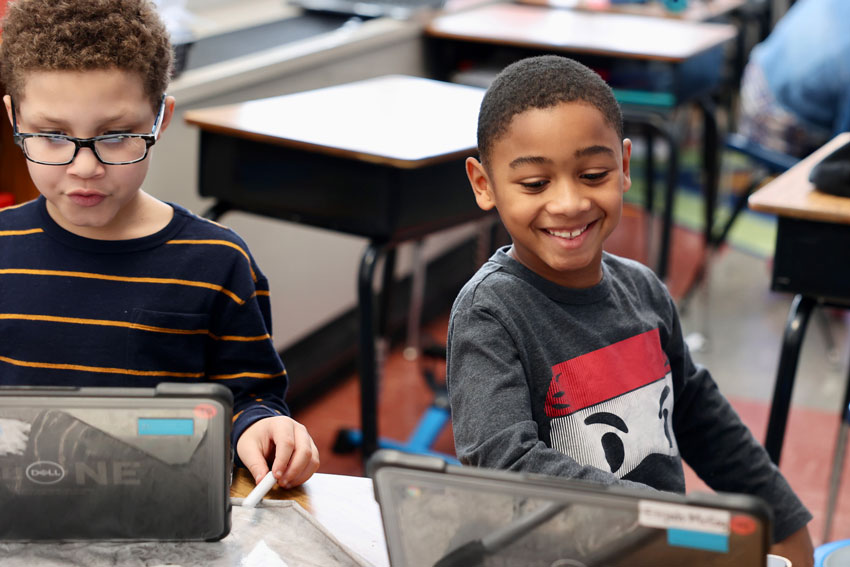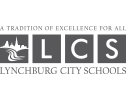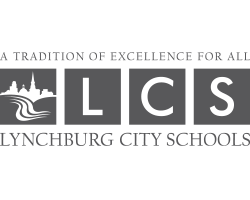
Everyday life has shifted back into pre-pandemic rhythms, but students are still feeling the effects of learning loss. Lynchburg City Schools (LCS) launched a high-intensity tutoring program this past fall for third through eighth grade students, joining schools across the commonwealth. The Virginia Department of Education’s (VDOE) ALL In VA tutoring program uses research-based methods to accelerate students to grade level in reading and math.
“High-intensity tutoring helps our students maximize instructional opportunities. We want to provide any avenue for success possible for our students,” said LCS Director of Instruction and Programs Jennifer Crews. “Meeting grade-level standards and growing academically promotes confidence. It opens pathways for the future, even impacting post-secondary outcomes.”
Accelerating Student Success
Three months into the program, students are on their way to academic success. Tutors help students grasp grade-level curriculum while connecting lost learning to what they’re studying in the classroom. Daily tutoring sessions are personalized based on each student’s Virginia Standards of Learning (SOL) scores, focusing on content areas they need to work on.
They receive varying levels of support in small groups–around 10 pupils to one tutor–to maximize focused help. LCS has more than 250 trained tutors conducting regular sessions, including licensed teachers, instructional assistants, retired teachers, and community members.
"As they work in small group settings with dedicated tutors, students are already increasing in confidence and catching up on learning they missed during the pandemic,” said Perrymont Elementary School principal Dominique Foster.
Student progress is monitored monthly, and tutors help each student improve in content areas where they need extra support. Advisors at each school use data collected during sessions to individualize and enhance tutoring approaches.
Implementation looks different at every school. The program is designed to adapt to students’ specific needs. When midterm and end-of-year standardized assessment data is available, schools will further implement programmatic changes based on scores.
“We’re confident these individualized learning opportunities will help benefit instructional outcomes,” Crews said.
Most people associate tutoring with after-school study, but All In VA learners don’t have to stay after hours. Sessions are held during regular school hours for sustained periods of time–up to 60 minutes a day or a minimum of three hours per week. Schools have adjusted their schedules to accommodate sessions. This ensures students won’t have to miss tutoring because of after-school activities or other commitments.
“Students are working with the same tutors every day, so they’re forming positive relationships to enhance overall outcomes. This helps promote their growth and engagement in the process,” Crews said.
Why Tutoring?
SOL scores from the 2022-23 school year demonstrated the need for a state-wide learning recovery program. While educators across the commonwealth are working hard to get students up to speed, they need additional support to rise to the level of their pre-pandemic peers.
Research shows that, on average, high-intensity academic tutoring can increase student achievement by an additional three to 15 months of learning. It has also been proven to increase student engagement and grades across all subjects.
Attendance, Literacy, and Learning
The tutoring program is part of the VDOE’s three-pronged approach to accelerate post-pandemic student success by addressing attendance, literacy, and learning.
Research shows that daily school attendance is crucial to student success. Over the next two years, LCS will help remove barriers to attendance by increasing transportation accessibility, implementing student incentive programs, and educating families about the importance of attendance through public information campaigns.
To accelerate literacy across the division, LCS will also implement literacy education based on data-backed principles, hire reading specialists, and provide families whose children aren’t meeting benchmarks with online resources.
Rebuilding for Excellence
“The pandemic brought real challenges, but together, we can guide our students to academic excellence. I’m confident our students will succeed with the support of our dedicated teachers, staff members, families, and community members,” said LCS Chief Academic and Student Services Officer Derrick Brown.
Community members can join the effort to close the gaps the pandemic has left behind. Applicants don’t need to be teachers; If accepted, they'll be trained in high-intensity tutoring before they start. Interested candidates can apply here.

